Non-urban metering
Find the information you need to make sure you are compliant with the non-urban metering reform.
Report a hazard - phone: 1800 061 069
WaterNSW head office
1PSQ, Level 14, 169 Macquarie Street Parramatta, NSW 2150
Contact us:
P: 1300 662 077
E: enquiries@waternsw.com.au
Postal address
WaterNSW
PO Box 398, Parramatta, NSW 2124
Locations and appointments
View offices or make a booking >
Warragamba Dam visitor centre
P: 02 4774 4433
Need an interpreter?
需要口譯員嗎?
Cần một thông dịch viên?
Necesitas un intérprete?
Hai bisogno di un interprete?
The recently amended non-urban metering regulation focuses on enhancing metering accuracy, ensuring compliance, and supporting sustainable water use. The regulation includes consistent metering standards and measures to strengthen oversight to ensure that 95% of licensed water take in NSW is accurately metered by the end of 2026, if not sooner.
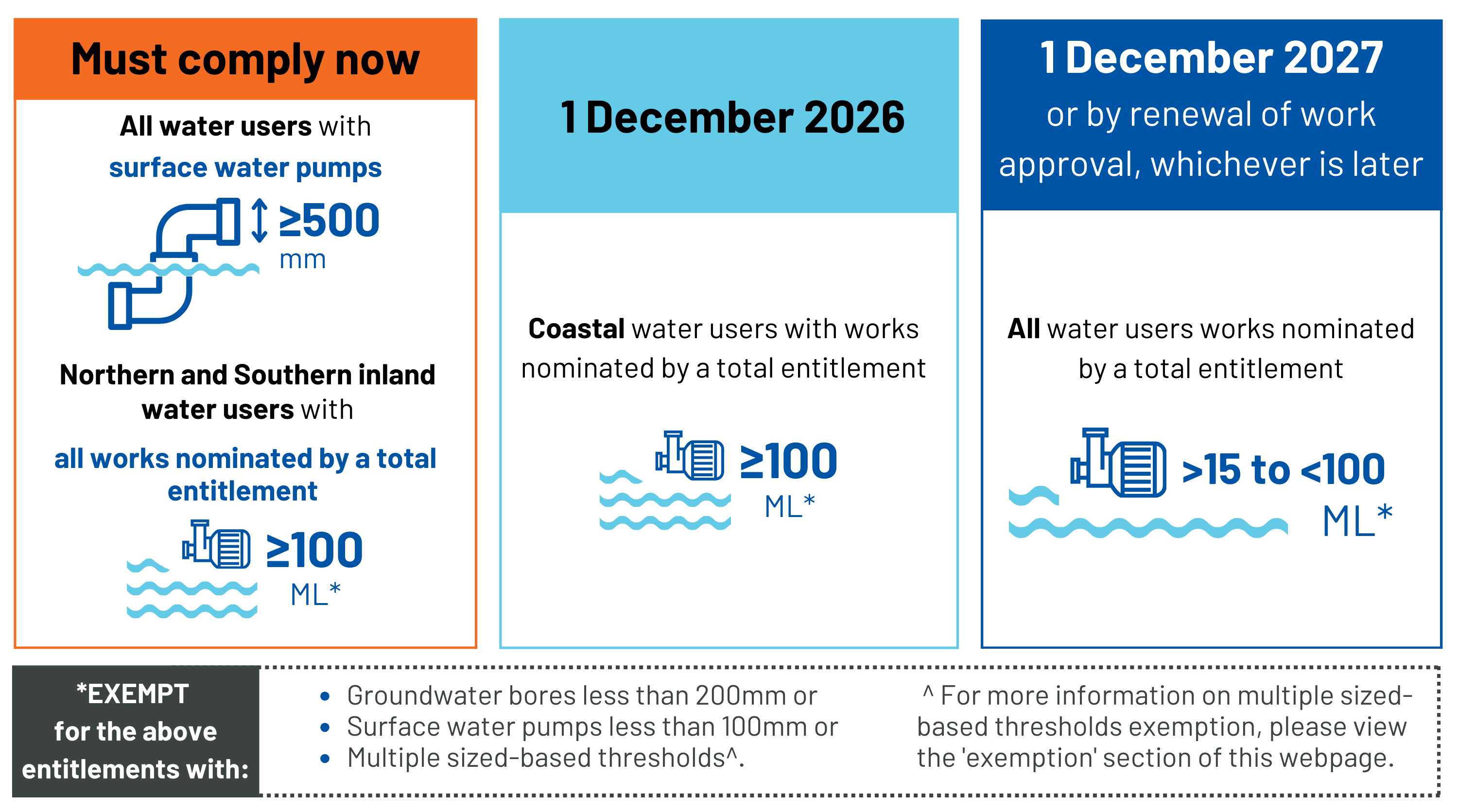
Step 1: Check your authorised size
With your work approval number, use the NSW Public Water Register to check your authorised work size. This will be listed under the title ‘Description’. Once you have found the authorised size of your work, you will be able to identify whether you are exempt from the non-urban metering rules. Groundwater bores less than 200mm and surface water pumps less than 100mm are exempt from the metering regulations.
*Please see below for more information on multiple size-based threshold exemptions in the ‘exemptions’ section of this webpage.
Step 2: Check your water entitlement
If you do not have a size-based exemption, check the water access licence number(s) associated with your approval (all licence numbers will be listed under your approval when searched on the NSW Public Water Register). You will need to use the NSW Public Water Register to check each of your licences and their associated water entitlements. To find your cumulative water entitlement (also known as a share component) you will need to add all of the licence entitlements together. You can also use our how-to find your cumulative water entitlement PDF, 1027.57 KB step-by-step guide or watch the video.
Step 3: Use the graphic to determine your requirements
Use the graphic below to determine what your metering requirements are.
For further assistance using the NSW Public Water Register, please view the information listed under 'how do I find my entitlement' below. Watch the NSW Public Water Register video to learn how to view water access licence and approval details and conditions.
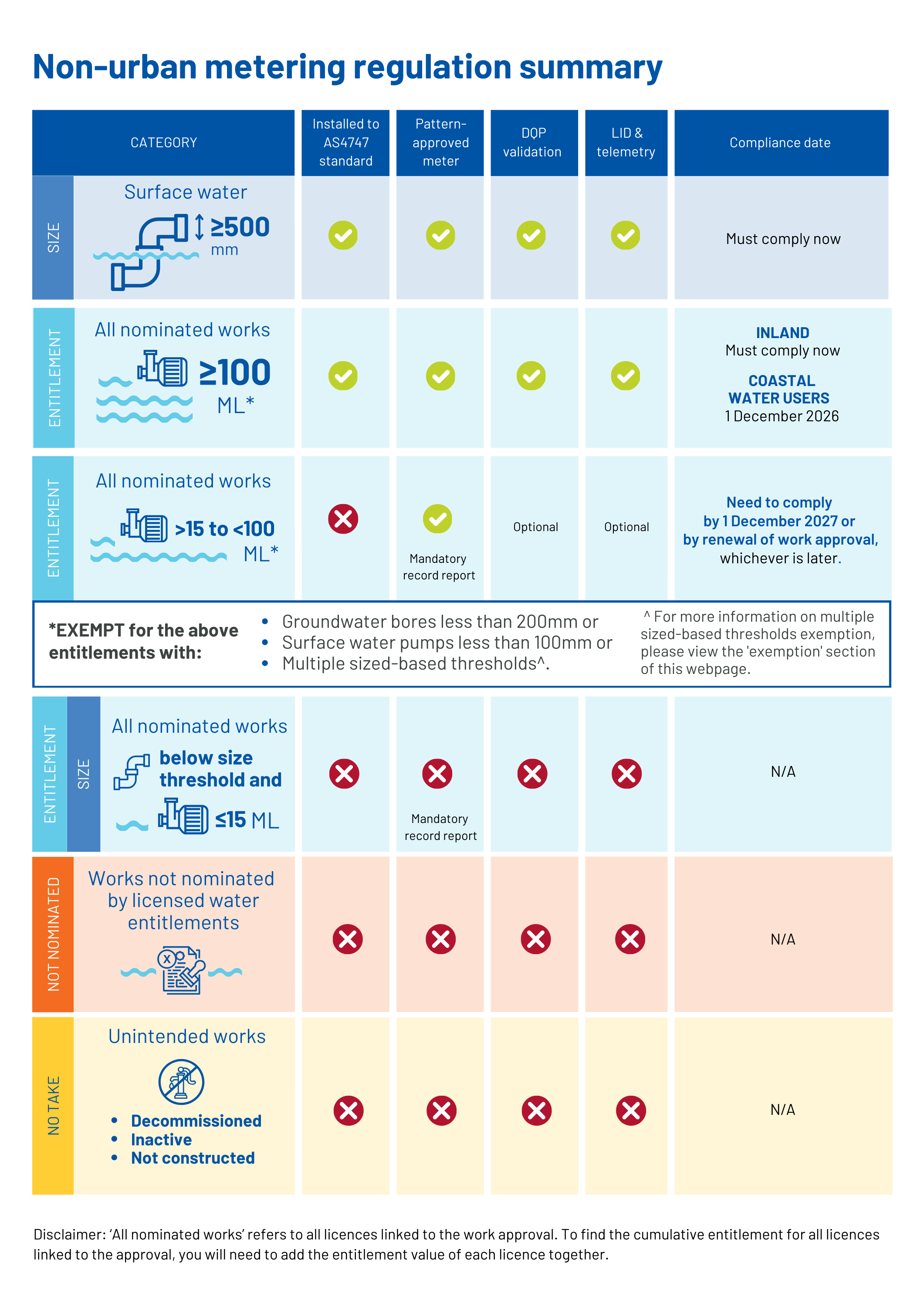
Alternatively, you can also use the NSW Government's online metering guidance tool to see if, and how, the rules apply to you.
 Need help?
Need help? We're here to help you! You can schedule a one-on-one meeting with our team to discuss your situation.
As part of the recent amendments to the non-urban metering regulation, the NSW Government has prioritised a water entitlement approach in structuring the metering requirements.
Water entitlement refers to the volume of water that a user is legally allowed to take under their water access licence. The non-urban metering regulation is structured around water entitlements rather than the physical size of infrastructure (e.g. pump diameter), in most instances. This ensures that compliance and regulations are tied to the actual legal allocation of water rather than the potential extraction capacity of water.
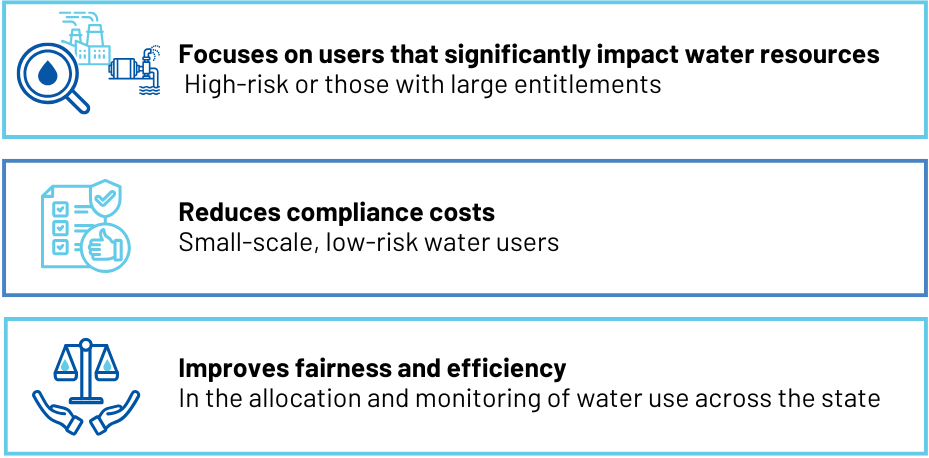
How do I find my entitlement?
To find the information relevant to your metering requirements, you can search the NSW Public Water Register. To locate both your cumulative entitlement and authorised work size, you will need to search the NSW Public Water Register.
Before using the NSW Public Water Register, you will need to locate your work approval number. You can find your work approval on your WaterNSW invoice.
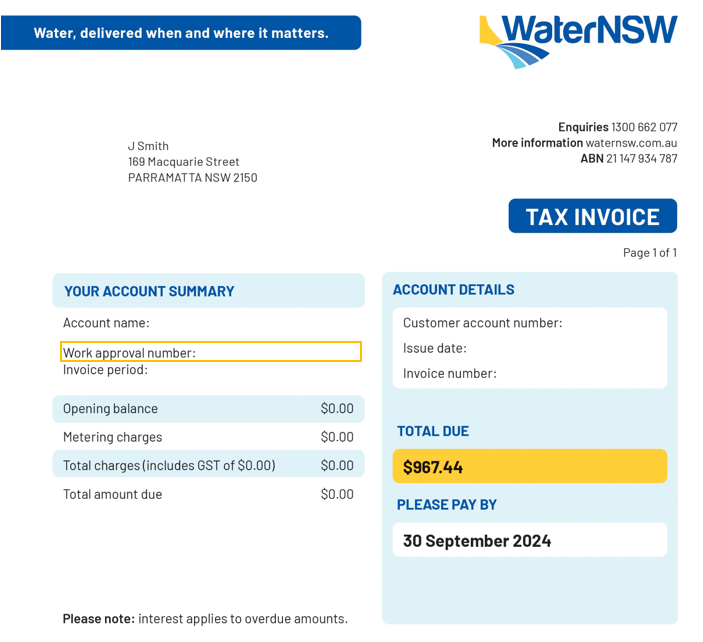
Step 1: Open the NSW Public Water Register and click ‘I want information about a particular water licence or approval (including conditions)’.
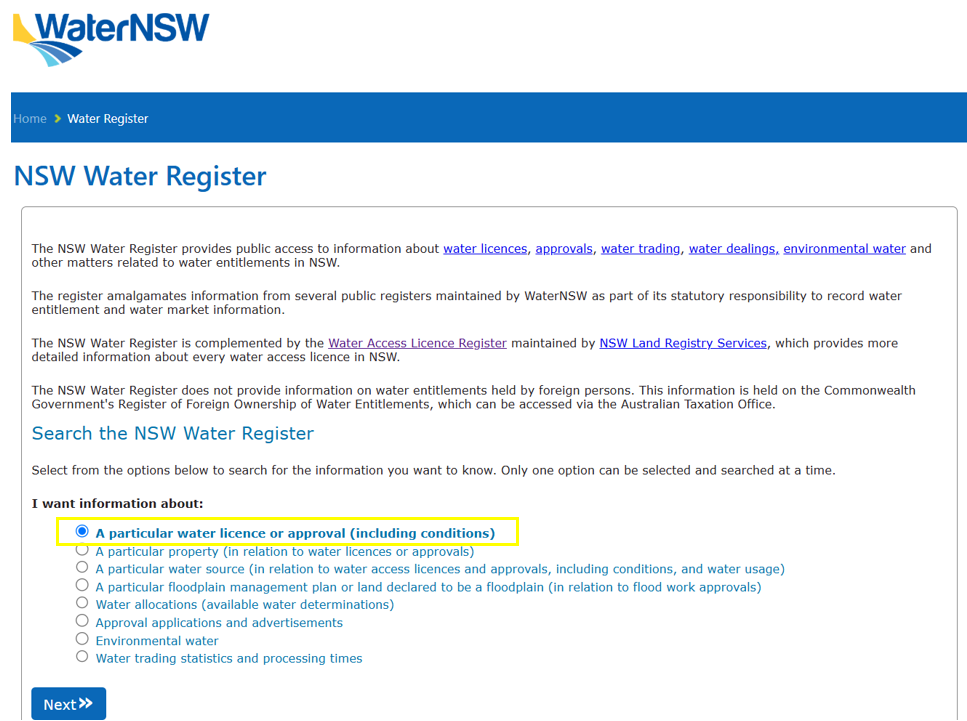
Step 2: Select ‘Approval issued under the Water Management Act 2000’, type in your approval number and click search.
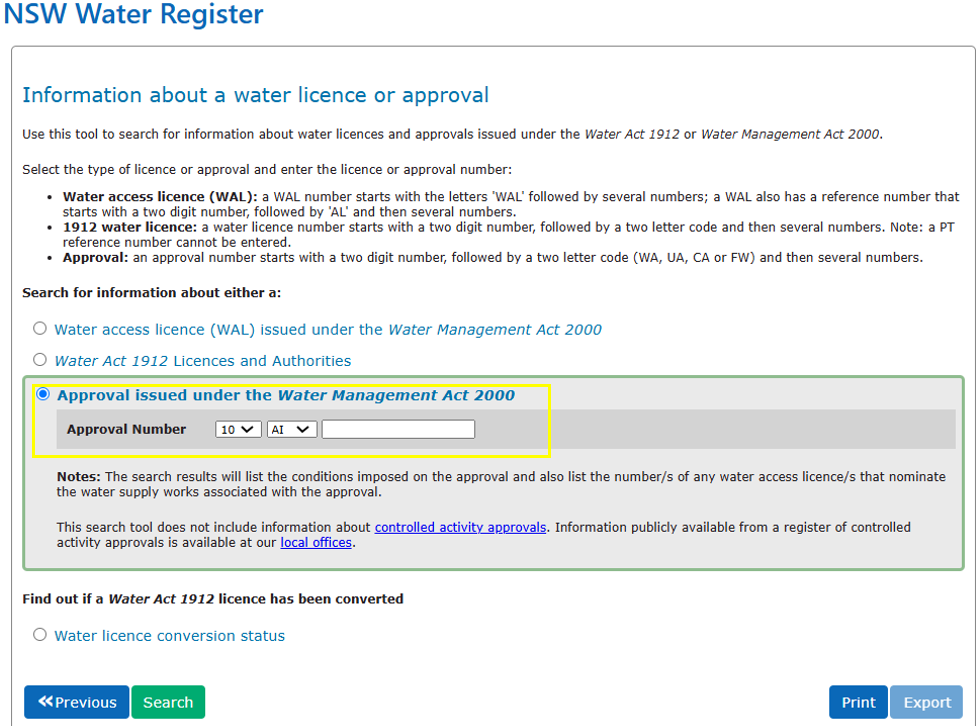
Step 3: Your authorised work size will be located under ‘Description’. If the authorised size is less than 100mm in diameter for surface water pumps or less than 200mm in diameter for groundwater bores, you are exempt from non-urban metering requirements. Take note of your water access licence numbers listed under the approval.
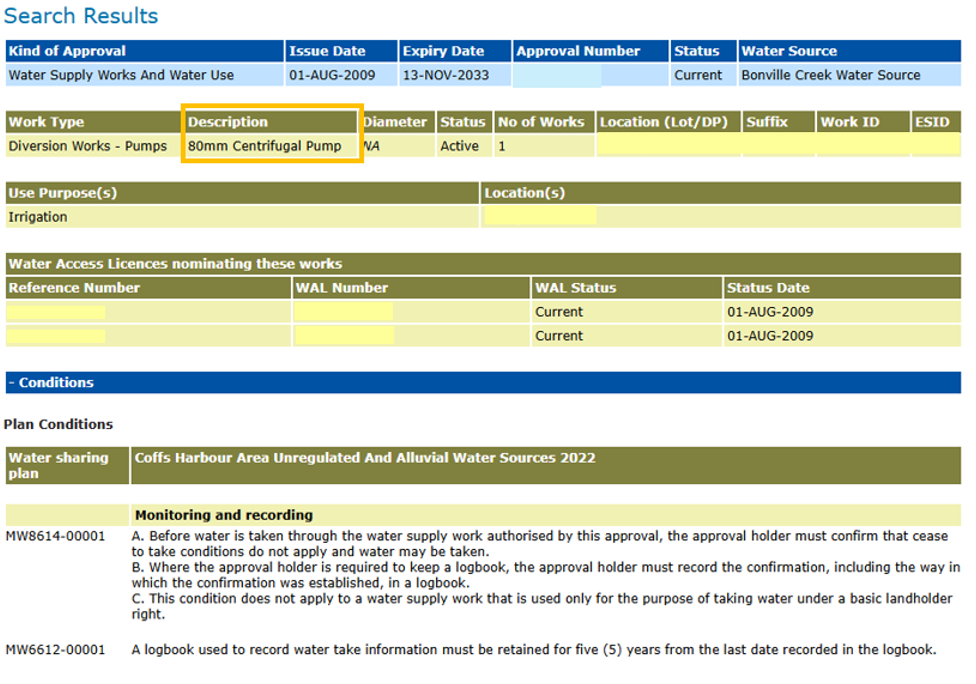
Step 4: If you do not have a size-based exemption, you will need to search each of your licences on the NSW Public Water Register to find the entitlement associated with them. First you will need to click ‘I want information about a particular water licence or approval (including conditions)’.

Step 5: Select ‘Water access licence (WAL) issued under the Water Management Act 2000’ and type in your WAL and click ‘search’.
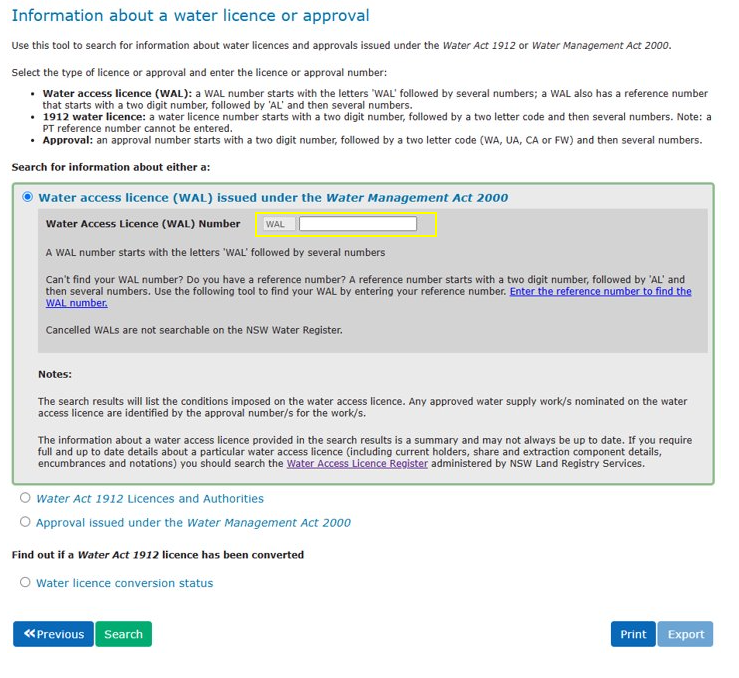
Step 6: You will notice under the search results the ‘share components’, which outlines the entitlement for that licence.
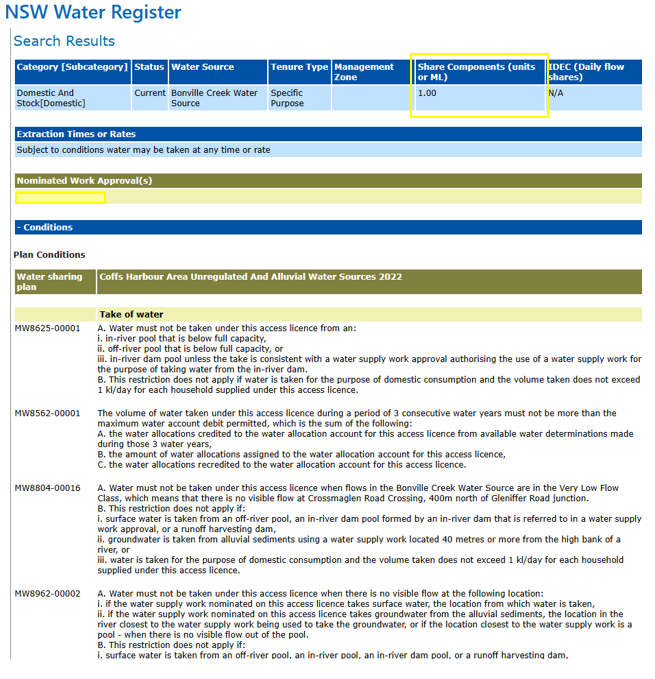
Step 7: You will need to add up all share components for each licence listed on the approval to understand what your cumulative entitlement is. Your requirements are tied to your approval, not each individual water access licence.
All water users across NSW with surface water pumps 500mm (irrespective of the entitlement associated with the work approval) and above, need to be compliant by having their metering equipment installed and certified by a duly qualified person (DQP).
To find your authorised surface water pump size, please search your work approval number on the NSW Public Water Register.

Water users are required to have:
The compliance deadline for this category of water user is now.
Both northern inland and southern inland water users with a total entitlement above 100ML (unless exempt) are required to be compliant with metering equipment installed and certified by a DQP now.
By 1 December 2026, all works within this category in the coastal region will need to have their metering equipment installed and certified by a DQP.
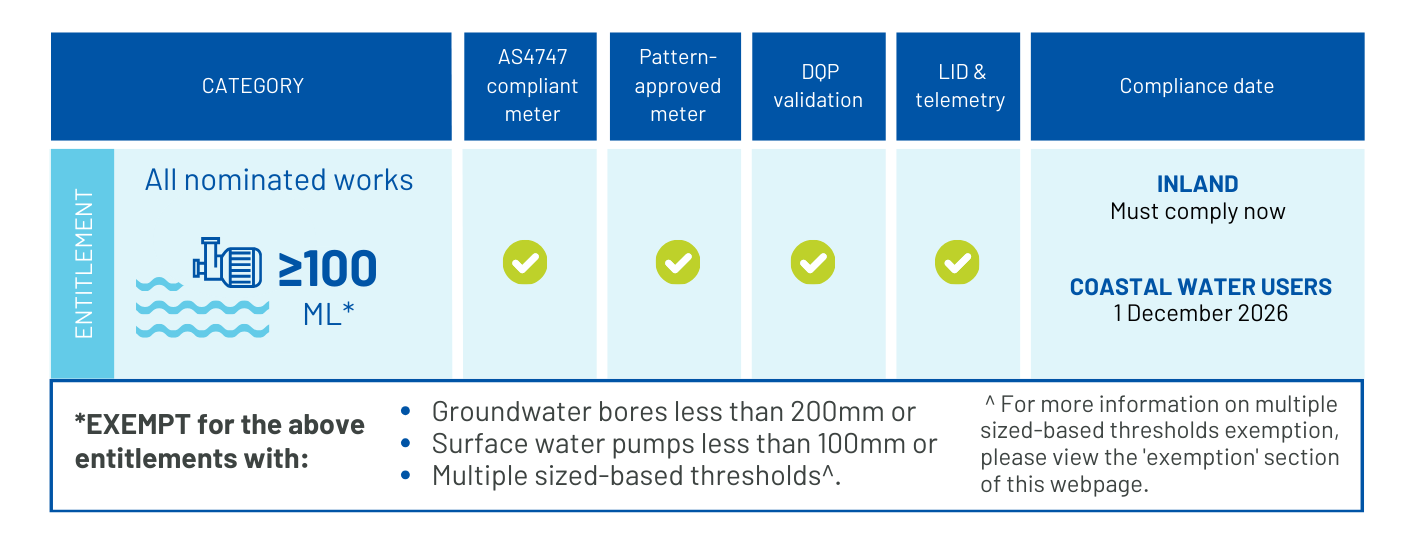
Water users are required to have:
The compliance deadline for inland water users in this category is now. Coastal water users must comply by 1 December 2026.
All water users across NSW with works nominated by total entitlement above 15ML and below 100ML must comply by 1 December 2027, or by the renewal of their work approval – whichever is later.
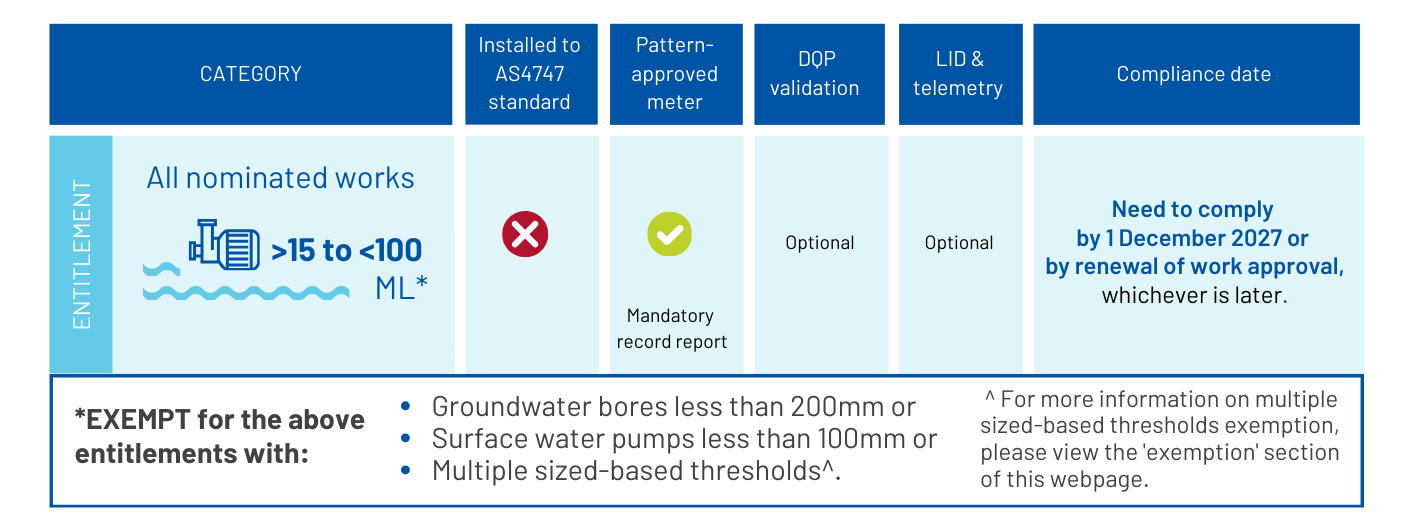
Water users are required to have:
The compliance deadline for this category of water user, unless exempt, is by 1 December 2027, or by renewal of work approval - whichever is later.
Water users in this new category will not have metering requirements mandated. This category is still required to record their water take.

Works that are classified as not taking licensed water
Water users in this category are exempt from metering. The work may not be taking licensed water due to several reasons including it has been decommissioned, is inactive, has not been constructed or is not taking from a water source – including taken under basic landholder rights (BLR).
Water users in this category are not required to physically modify the work to make them incapable of taking licensed water, but it does enable the Minister to amend a water supply work approval to categorise it as not taking licensed water.
Water users will have a condition on their licences prohibiting them to take water if it is indicated as a work that falls into a category above.

To classify your work as not taking licensed water, please register or login to the Customer Portal and complete the ‘Amend the status of your work’ form. You can also find information on the different situations classified as an unintended work in this fact sheet (PDF, 465.18 KB).
Please note: There may already be a pre-populated status for your work in the Customer Portal based on our records. If there isn’t a status pre-populated or the status selected is incorrect, please select the correct classification to describe your work.
Further information:
Works not nominated by licensed water entitlement
Water users not nominated by licensed water entitlements have no change. They are not required to meter.

Exemptions
Exemptions have been established for types of water take that are considered ‘low risk’. This includes:
Type of work | Number | Maximum diameter permitted |
Surface water (pumps) | 2 pumps | 74mm in diameter each |
Surface water (pumps) | 3 pumps | 49mm in diameter each |
Surface water (pumps) | 4 pumps | 39mm in diameter each |
Groundwater (bores) | 2 bores | 159mm in diameter each |
Groundwater (bores) | 3 bores | 129mm in diameter each |
Groundwater (bores) | 4 bores | 119mm in diameter each |
For further information on these exemptions, please visit the NSW DCCEEW website.
 Equipment information
Equipment information Find information on non-urban metering equipment including pattern-approved meters, local intelligence devices, telemetry and duly qualified persons (DQPs).
The National Measurement Institute of Australia (NMI) ensures that non-urban water meters meet compliance standards by testing them against the Australian Standard for Non-Urban Water Meters (AS4747). If a meter passes, it is granted pattern approval, certifying it as compliant. Under the new metering rules, certain water users need to be fitted with a pattern-approved meter by their rollout date.
The Commonwealth Department of Climate Change, Energy, Environment and Water maintains a list of pattern-approved non-urban water meters.
The revalidation requirements for AS4747 compliant meters is 10 years after initial installation and every 5 years thereafter.
Telemetry refers to the remote and automatic collection and transmission of water usage data from metering equipment. This process is facilitated by a local intelligence device (LID), which communicates data to a secure cloud-based system, the data acquisition service (DAS) managed by WaterNSW. The data is then used by WaterNSW, NSW DCCEEW and NRAR for billing, compliance, and water management purposes. You will also be able to access your data through a secure dashboard.
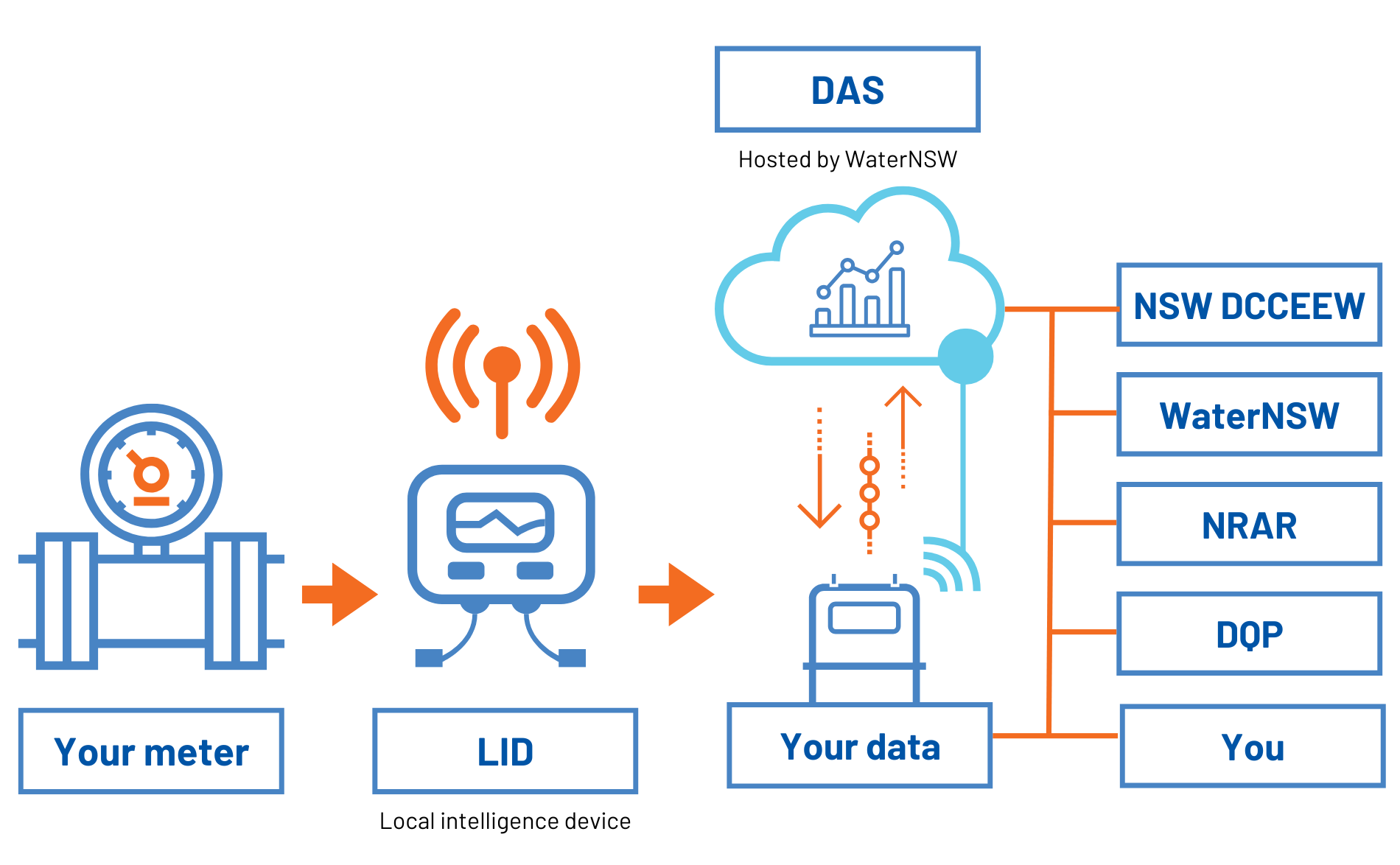
For more information on telemetry, please refer to our telemetry fact sheet and DAS user guide.
Telemetry Uplift Program
The Telemetry Uplift Program aims to assist eligible water users with compliance to the metering rules. If you’re a groundwater user in the Murray-Darling Basin, you may qualify for a fully funded telemetry device and installation on your compliant meter, courtesy of the Australian government.
Visit the NSW DCCEEW website to find out more about the program and to check if you are eligible.
Duly qualified persons (DQPs), also known as certified meter installers (CMIs) are trained to install metering equipment and ensure it’s working properly. They can also give you advice about the best metering equipment to use and help you comply with the new metering rules.
A significant barrier to the metering rollout has been the shortage of DQPs to install AS4747 standard equipment. To assist with compliance, NSW DCCEEW has now expanded the definition of DQPs to include individuals with relevant skills such as plumbers, electricians, or other similar trades once they have completed a short induction program. Low-risk water users will be able to have a verified tradesperson install their metering equipment, for more information please visit NSW DCCEEW website.
The re-validation requirements are now 10 years after the initial installation, and every 5 years thereafter to enable DQPs to focus more immediately on installation. In-situ accuracy testing as a standard revalidation requirement has also been removed to align with national requirements.
Validation Certificate reminder: A site will only be marked as compliant with the non-urban metering framework once a validation certificate has been issued. If you and the customer have not received the validation certificate, this job requires additional work to be complete.
Find a DQP Find a Hydrographer
Are you a DQP or verified tradesperson?
Visit our DQP assistance webpage for further information.
If your metering equipment is faulty or if telemetry connection is lost for more than 72 hours, you must notify WaterNSW within 24 hours. If you do not report a faulty meter, it is a breach of the Water Management Act 2000. Please see the steps below to complete the relevant S91i form.
Steps to complete an S91i
1. Report the faulty meter to us when you notice it isn't working properly.
Report a faulty meter using our online s91i self-reporting form.
2. Repair or replace the meter within 21 days and have it certified by a DQP (if required).
3. Submit a completion form within 28 days of repairing or replacing your equipment.
The introduction of a new ‘faulty metering’ rule during flood events will enable water users to take water from supplementary events if their meter is unable to be operated due to flooding. Alternate measurement rules will apply. Read the Faulty meters fact sheet (PDF, 493.01 KB) for more information.
The data acquisition service (DAS) gives you real-time visibility of your water usage. You can check your meter readings in hourly increments, monitor telemetry battery health, and view alarms - all from one secure dashboard.
Your local intelligence device (LID) communicates data to a secure cloud-based system, the DAS which is managed by WaterNSW. This data supports billing, compliance, and water management across WaterNSW, NSW DCCEEW, and NRAR, while giving you easy access to your own usage insights at any time.
Please note: You will receive an email from the DAS with a link to your site/s once the DQP has completed the installation work and a final Validation Certificate has been issued to you via email.
Recording and reporting
After each rollout date, all water users, even those who have installed a meter, may have ongoing recording and reporting requirements that are required under the Water Management (General) Regulation 2025. You will find more information and resources on our recording and reporting webpage, such as your requirements, our new megalitre calculator and videos to help you to record and report correctly.
To help you stay on top of your monthly or annual reporting requirements, you can now sign-up to our complimentary SMS reminder service.
Our 24/7 online Water Accounting System (iWAS) allows you to easily access and manage your water account anywhere, anytime. The easiest way to complete your recording requirements is by using iWAS. Login or register to complete your requirements today! |
Government-owned meters
As part of the non-urban metering framework, WaterNSW will continue to manage the compliance and ongoing maintenance of existing government-owned meters.
If you are currently using a government-owned meter, we’ll be in touch before your rollout date. However, if you have any questions regarding your government-owned meter, please contact us on 1300 662 077 or email meter.maintenance@waternsw.com.au
If you no longer want WaterNSW to provide and manage your government-owned meter, please complete this online opt-out form and we will contact you to discuss the next steps. Please note if you opt-out of the government-owned meter program you will be responsible for your metering equipment and ongoing compliance obligations, which includes engaging your own DQP.
You can find more information using our:
Change the size of a pump or bore
It is your responsibility to check whether the size and type of work installed on your property is the same as what is listed on your approval. You can view your approval details by visiting the NSW Public Water Register.
Notify us
Some water users may have works installed which are smaller than what is listed on their approval. Under recent amendments to the metering regulations water users can now notify us of the actual size of their work if it is smaller than what is listed on their approval. This means that you will be required to comply with the installed size, not the size listed on your approval. Approval holders must also notify the department within 90 days if they demolish a work that is smaller than what is authorised on their work approval but then construct a different sized work – refer to clause 248A in the regulation.
Please note: By notifying us that you have a smaller work installed than what is listed on your approval does not amend your approval. Therefore, the fee associated with amending a work approval does not apply.
What if your work is larger than what is listed on your approval?
If your work is larger than what is listed on your approval, you are in breach of your approval conditions and may be subject to NRAR compliance checks.
You can apply to amend your approval to increase the authorised work size here. However please note, this is subject to the regular assessment process.
Understand what role each water agency has in the metering program.
The NSW Department of Climate Change, Energy, the Environment and Water (NSW DCCEEW) is responsible for making the state’s water laws and policies and is responsible for issuing some licences and approvals.
WaterNSW is responsible for implementing the laws and policies, as well as issuing, and amending licences and approvals for the majority of water users and billing water use/metering charges for all customers.
Natural Resources Access Regulator (NRAR) is NSW’s independent water regulator. Its purpose is to ensure compliance with, and enforcement of the state’s water laws.
Non-urban metering fact sheets
Government-owned meters
Recording and reporting
Our 24/7 online Water Accounting System (iWAS) allows you to easily access and manage your water account anywhere, anytime. The easiest way to complete your recording requirements is by using iWAS. Login or register to complete your requirements today! |
WaterNSW acknowledges the traditional custodians of the lands and waters on which we work and pay our respects to all elders past, present and emerging. Learn more